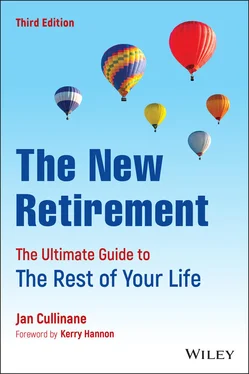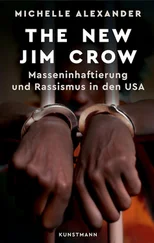Jan Cullinane - The New Retirement
Здесь есть возможность читать онлайн «Jan Cullinane - The New Retirement» — ознакомительный отрывок электронной книги совершенно бесплатно, а после прочтения отрывка купить полную версию. В некоторых случаях можно слушать аудио, скачать через торрент в формате fb2 и присутствует краткое содержание. Жанр: unrecognised, на английском языке. Описание произведения, (предисловие) а так же отзывы посетителей доступны на портале библиотеки ЛибКат.
- Название:The New Retirement
- Автор:
- Жанр:
- Год:неизвестен
- ISBN:нет данных
- Рейтинг книги:5 / 5. Голосов: 1
-
Избранное:Добавить в избранное
- Отзывы:
-
Ваша оценка:
- 100
- 1
- 2
- 3
- 4
- 5
The New Retirement: краткое содержание, описание и аннотация
Предлагаем к чтению аннотацию, описание, краткое содержание или предисловие (зависит от того, что написал сам автор книги «The New Retirement»). Если вы не нашли необходимую информацию о книге — напишите в комментариях, мы постараемся отыскать её.
The New Retirement: The Ultimate Guide to the Rest of Your Life
The New Retirement, 3rd edition,
The New Retirement — читать онлайн ознакомительный отрывок
Ниже представлен текст книги, разбитый по страницам. Система сохранения места последней прочитанной страницы, позволяет с удобством читать онлайн бесплатно книгу «The New Retirement», без необходимости каждый раз заново искать на чём Вы остановились. Поставьте закладку, и сможете в любой момент перейти на страницу, на которой закончили чтение.
Интервал:
Закладка:
Just for Fun
Since you're thinking about retirement, it's helpful to know some of the vocabulary. Here are a dozen words/acronyms you “need” to know:
KIPPERS (kids in parents' pockets eroding retirement savings): Hint – save for your own retirement first. Kids have more time than we do to save for the future.
SKIER (spending the kids' inheritance): SKIERs plan to spend all their money before they die … travel, have multiple homes, eat out, own luxury vehicles, and so forth.
Kidults: Offspring between the ages of 18 and 25, often financially and psychologically dependent on their parents. They are caught in the transition between childhood and adulthood, also known as “adultolescence.”
Splitters: Those who split their time between two (or more) homes. About 15% of adults over 50 own a second home, according to the Research Institute for Housing America.
FANBY (find a new backyard): People who relocate multiple times, perhaps moving to a resort style area, then closer to children/grandchildren, then to an active adult community, and then a CCRC (continuing care retirement community).
Freemales: Women who choose to be single (remove “spinster,” “old maid,” and “crazy cat-lady” from your vocabulary now).
Wusband: Self-explanatory.
Gray Divorce: Divorce among those 50 and older. The divorce rate in this age group has doubled over the past decade, and now makes up 25% of all uncouplings, according to Susan Brown, professor of sociology at Bowling Green State University. You may recall that Bill and Melinda Gates put out this statement after 27 years of marriage: “We no longer believe we can grow together as a couple in this next phase of our lives.” Two-thirds of gray divorces are initiated by women. Most common reasons for divorce from a survey of almost 2,400 recently divorced couples: falling out of love by one or both spouses (the most common reason); issues communicating (a close second); lack of caring, trust, or respect; a desire to move in a different direction because they had grown apart. For many, “'til death do us part” is no longer valid when life is long … and life is short.
Returnment: Going back to work after leaving a primary career.
Jhobby: Turning a hobby into a paycheck.
LATs (living apart together): Couples in committed relationships who maintain separate residences. Kevin R., for example, had a number of corporate transfers that required him to live in several different states throughout his career, but his wife, Caroline, a nurse, remained in their home in Michigan until Kevin retired.
LTAs (living together apart): No longer a couple, but remaining in the same household because of finances, children, or the perception of social stigma.
Quiz: Are You Ready to Launch Your Retirement?
For each question, please choose the statement which best fits your thinking and frame of mind at the present time. More than one answer may seem appropriate but you must pick only one .
1 How do you feel about giving up your job and career?AMy career is history. I'm ready to open a new chapter.BI would enjoy meeting other retirees from my profession.CI would like to stay up to date with trends and developments in my profession just to keep my hand in it.DOnce retired I'll be happy to mentor younger people in my profession.
2 How open are you to new adventures in your retirement?AI'll probably do things I've done in my past, but now I'll have more time for them.BI'm itching to try some things I never had time for during my career.CI don't plan on changing my leisure activities that much.DI earned my retirement so I'm going to have fun doing nothing.
3 What part will exercise play in your retirement?AMy outdoor activities will keep me in good shape.BI'll keep my weight in check by walking.CI plan to have a regular daily exercise program.DI probably won't have a planned exercise program.
4 Do you plan to include weight training?AWeight training may do me more harm than good.BWeight and resistance training will be part of my exercise program.CI'll get enough exercise through aerobic activities.DBody building for seniors doesn't make sense to me.
5 How “home-based” will your retirement be?AI'll spend a lot of time at home doing at least one of these activities – watching TV, talking on phone, doing household chores, working on computer, reading.BChilling out at home is my idea of retirement.CIf I am home too much I have to get out.DI expect to spend a good deal of time carrying on activities outside the home.
6 How does your spouse's retirement coincide with your own?AMy spouse has already retired.BMy spouse does not plan to retire any time soon.CMy spouse and I plan to retire together (within an 18-month period).DI don't have a spouse.
7 What is the status of your children?AI still have children living at home.BI have no children living at home.CI have “boomerang kids” who may want to return home for a while.DI have no children.
8 Are you at risk for depression?AI have suffered bouts of depression in the past.BMy spouse has had some problems with depression.CI have no history of depression.DI get anxious now and down at times but not what you'd call clinical depression.
9 Are you a “hobby person”?AI have no major hobbies but I may find one during retirement.BI have some hobbies to keep me busy.CI don't really need any hobbies to enjoy retirement.DThere is at least one current hobby that I can devote more time to during retirement.
10 How active are you in community organizations?AI'm not a joiner.BI plan to become active in some organizations once I retire.CI'm already active in several church/social/civic organizations.DI belong to some organizations, but I'm not very active.
11 Do you like volunteer work?AI already do volunteer work when I find time.BI have other activities that keep me busy and don't need volunteer work.CI prefer to work for pay.DI plan to volunteer some of my time during retirement.
12 What friends do you spend the most time with?AI have close friends from work and outside of work.BI make friends easily and my time with them varies widely.CI spend as much as half of my social time with friends I know from work.DI spend only a small part of my time socializing with work friends.
13 Do you have a good support network?AI have at least five close friends that I see often.BMy social circle includes more than a dozen good friends.CI enjoy my own company and am not really a social person.DI have one or two friends I see regularly.
14 How will travel play a role in retirement?AI enjoy travel more than my spouse.BI enjoy being close to home.CI enjoy travel and look forward to many trips during retirement.DMy spouse enjoys travel more than myself.
15 How important is family time in retirement?AI look forward to family visits during retirement.BI plan to spend more time with family during retirement.CVisits to family members won't play much of a role in retirement.DVisits to my spouse's family are too frequent or too long.
16 Do you and your spouse (or significant other) enjoy doing things together?AWe don't have the same interests.BWe have some interests in common.CWe like doing things together and separately.DI don't have a spouse or significant other.
17 Will learning and study play a role in retirement?AIt may play a role if I find something I like.BI finished school a long time ago. Why go back to the classroom?CMy spouse or friends have encouraged me to take some courses.DTaking courses on various subjects will make retirement more interesting.
18 How's your work/play ethic?AI earned my rest so I don't plan to work at anything too hard.BI'll throw myself into my retirement just as I did my work.CThe less the work the less the stress in my retirement.DI won't mind work as long as it's not too taxing.
Читать дальшеИнтервал:
Закладка:
Похожие книги на «The New Retirement»
Представляем Вашему вниманию похожие книги на «The New Retirement» списком для выбора. Мы отобрали схожую по названию и смыслу литературу в надежде предоставить читателям больше вариантов отыскать новые, интересные, ещё непрочитанные произведения.
Обсуждение, отзывы о книге «The New Retirement» и просто собственные мнения читателей. Оставьте ваши комментарии, напишите, что Вы думаете о произведении, его смысле или главных героях. Укажите что конкретно понравилось, а что нет, и почему Вы так считаете.












